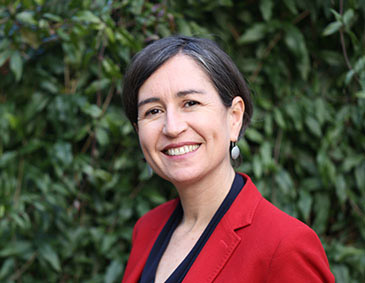Faculty Spotlight: Susana Ferreira
Thursday, September 30, 2021
Sustainable UGA Faculty Spotlight: Dr. Susana Ferreira
Name: Susanna Ferreira
Position: Professor
Department: Agricultural and Environmental Economics
Dr. Susanna Ferreira empowers students to address pressing sustainability challenges through an economic lens.
A native of Spain, Dr. Ferreira completed her undergraduate studies at the University of Navarra, before continuing her graduate work in economics at the University of California, San Diego. Dr. Ferreira's research interests are divided into two primary areas. The first focuses on economic causes and effects of natural disasters, with an emphasis on hydro-meteorological events, and valuation of social and economic outcomes precipitated by micro- and macro-level environmental changes. Her second research area focuses on pioneering the use of innovative tools for measurement of social and economic progress through the consideration of subjective well-being indicators and their determinants, particularly environmental factors.
Dr. Ferreira is involved in many organizations at UGA, holding affiliate faculty positions with 1) Water Resources at UGA, 2) the Center for Integrative Conservation Research, 3) the Latin American and Caribbean Studies Institute, 4) the Interdisciplinary Sustainability Certificate, and 5) the Institute for Resilient Infrastructure Systems. Please read below for our full interview with Dr. Ferreira.
When asked what inspired her to teach about sustainability, Dr. Ferreira remarked, "I don't remember wanting to be an environmental economist when I was growing up - I didn't even know what that was! It was not an "aha" moment, either. It was a collection of realizations and small decisions that led me to pursue an academic career in environmental economics. I wanted to understand the drivers of environmental degradation and contribute to implementing solutions, and I found in Economics a very powerful analytic framework and collection of tools to do just that." She added, "Today I feel privileged to be in a classroom where my students can also realize the importance of addressing sustainability challenges through an economic lens."
On the importance of teaching students about sustainability, Dr. Ferreira quipped, "I cannot think of anything more important! I only half joke when I tell my students that environmental economics is the most important course they will ever take." She elaborated, "In the age of the Anthropocene, as it is becoming more and more apparent that human demands from the biosphere are exceeding its capacity to provide, understanding the interdependence between the economy and the environment is fundamental for our well-being and that of future generations."
While Dr. Ferreira hopes that students take away many things from her classes, one of the most important lessons she hopes to impart is "that economic activity does not happen in a vacuum, that in economic designs we often fail to properly account for environmental impacts." She emphasized, "But I don't want them to feel powerless or pessimistic about the magnitude of the environmental challenges we face. I want them to learn the economic tools and principles to understand why we are here and to design good public policies that can improve environmental and social outcomes. In the process, I hope that they will sharpen their critical thinking skills to grasp the complexity of environmental issues and the need to cross disciplinary barriers."
